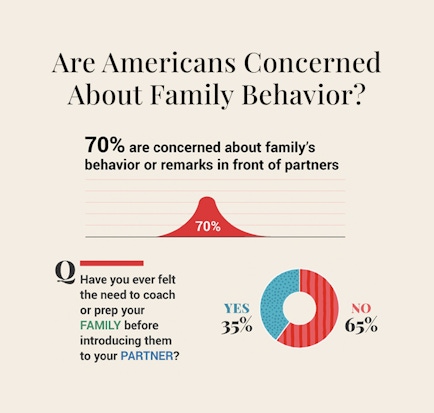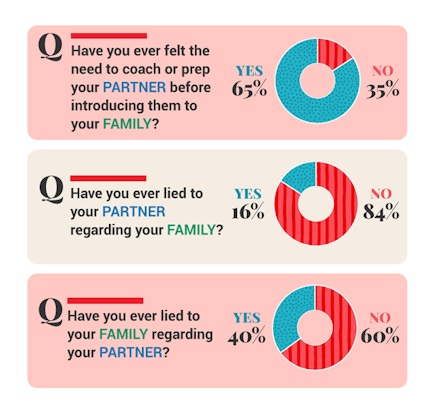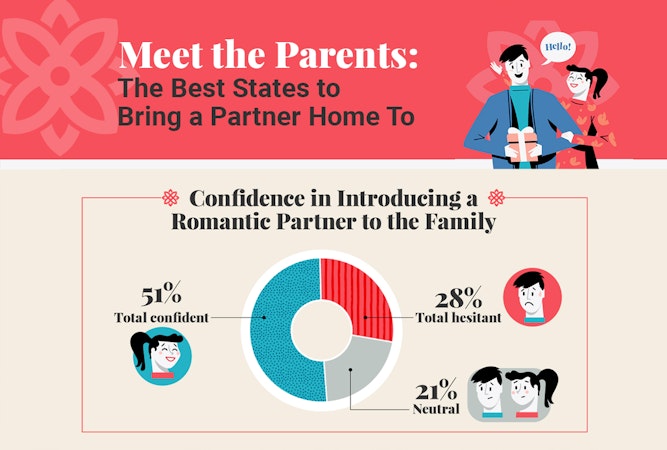Meet the Parents: The Best States to Bring a Partner Home To

Embarking on the journey of introducing your romantic partner to your family is a significant milestone, filled with various emotions and potential challenges.
There are so many variables: Will your mom or dad wreak havoc during your first outing together? How will your partner respond to the way your sister acts whenever you bring someone around? No matter what questions you’re asking yourself – even if it is whether to introduce your partner to your family at all – we have some insights and tips for you to help ease the potential tension.
Our recent survey of 2,000 Americans looks into the dynamics of the always interesting meet-the-parents process, taking a peek at how the state you live in affects these meetings, typical concerns about family (and partner) behavior, and how social media shapes these relationships. So, just how comfortable are most people when opening this proverbial door? You’d be surprised.
Why It Matters: as our culture changes, relationship dynamics and expectations do, too. This study provides crucial insights into the emotional and social aspects of introducing romantic partners to families, highlighting the influence of geographical, familial, and digital factors on this relationship milestone.
Key Findings
• 51% of Americans surveyed express total confidence in introducing their romantic partners to their families.
• Pennsylvania leads the states with an impressive 96% confidence level in the process of bringing a partner home.
• A substantial 35% of respondents feel the need to coach their families before introducing their partners, while 65% prepare their partners for the family introduction.
• Americans are stressed about their families’ online presence; 38% have blocked a family member on social media.
Best and Worst States for Bringing a Partner Home
Best States for Bringing a Partner Home
Worst States for Bringing a Partner Home





Comfort Levels in Introducing Partners to the Family
Understanding how people feel about introducing their romantic partners to their families, if nothing else, is complicated. That said, it’s pretty heartening to know that a hefty 51% of those surveyed expressed total confidence in doing so – a solid and encouraging number. Another 28% admitted to feeling hesitant, period, and the remaining 21% fell into the neutral zone.
Even if you’re not surprised by these numbers, it's worth going a little deeper into the numbers to figure out just why people feel the way they do about this process, like how family behavior or remarks might impact romantic partners, or how partners choose to respond to families and hometowns that aren’t their own.
It’s safe to say the people who feel hesitant are most concerned about how their families might behave, with 70% expressing apprehension about it when bringing a partner home. Perhaps this emphasizes the significance of managing expectations and preparing for potential challenges that may arise during these encounters.
Talking with a partner openly about your worries when it comes to introducing them to your family is the best thing you can do to both manage expectations and prep for that all-encompassing moment – and hopefully any awkward ones that follow. After all, open communication is the key to a long-lasting, healthy relationship, right? (That, and thoughtful bouquets of monthly flowers, of course.)
Comfort Levels in Introducing Partners to the Family
Understanding how people feel about introducing their romantic partners to their families, if nothing else, is complicated. That said, it’s pretty heartening to know that a hefty 51% of those surveyed expressed total confidence in doing so – a solid and encouraging number. Another 28% admitted to feeling hesitant, period, and the remaining 21% fell into the neutral zone.
Even if you’re not surprised by these numbers, it's worth going a little deeper into the numbers to figure out just why people feel the way they do about this process, like how family behavior or remarks might impact romantic partners, or how partners choose to respond to families and hometowns that aren’t their own.
It’s safe to say the people who feel hesitant are most concerned about how their families might behave, with 70% expressing apprehension about it when bringing a partner home. Perhaps this emphasizes the significance of managing expectations and preparing for potential challenges that may arise during these encounters.
Talking with a partner openly about your worries when it comes to introducing them to your family is the best thing you can do to both manage expectations and prep for that all-encompassing moment – and hopefully any awkward ones that follow. After all, open communication is the key to a long-lasting, healthy relationship, right? (That, and thoughtful bouquets of monthly flowers, of course.)
Best and Worst States For Bringing a Partner Home
While our states are certainly united, geographical specifics play a more important role in how individuals approach this pivotal introduction than you might realize.
The top state where confidence levels in this rite-of-passage seemingly soar? Pennsylvania, at an incredibly impressive 96% confidence level. We aren’t sure if this has something to do with homegrown, country vibes, or if this keystone state literally has, well, the key, but we’re happy for them.
Close behind are Delaware (93%), Idaho (92%), and Mississippi (90%), passing with A scores in confidence, and New Mexico, Tennessee, Vermont, Oregon, and Louisiana all in the 80th percentile when it comes to feeling good about bringing home their love. Iowa rounded out the top ten with 75% of those assured about going into this momentous occasion.
On the flip side, certain states seem to evoke higher levels of anxiety when it comes to this significant step. Kansas tops the list with an 85% anxiety level, followed by Utah at 82% and Hawaii in third at 75%. Nebraskans, Oklahomans, and South Carolinians have significant worries about partner introductions at 71%, 68%, and 67%, respectively, with Kentucky, New York, Wisconsin, and Michigan residents following suit ranging from 63% anxious to 55%.
But what do these lists of states have in common? Although they may not seem linked in any way, attempting to understand regional variations may help people navigate potential challenges associated with introducing partners to their families.
For states with higher confidence levels, maybe it’s the densely outdoorsy, adventurous, chiller cultural vibes – and a bit of luck in the familial acceptance department. States with higher anxiety levels are more rural and possibly more conservative, with a potentially larger emphasis on family ties or religious beliefs – both of which may mean a higher level of importance on a partner needing to meet certain standards.
Best and Worst States For Bringing a Partner Home
While our states are certainly united, geographical specifics play a more important role in how individuals approach this pivotal introduction than you might realize.
The top state where confidence levels in this rite-of-passage seemingly soar? Pennsylvania, at an incredibly impressive 96% confidence level. We aren’t sure if this has something to do with homegrown, country vibes, or if this keystone state literally has, well, the key, but we’re happy for them.
Close behind are Delaware (93%), Idaho (92%), and Mississippi (90%), passing with A scores in confidence, and New Mexico, Tennessee, Vermont, Oregon, and Louisiana all in the 80th percentile when it comes to feeling good about bringing home their love. Iowa rounded out the top ten with 75% of those assured about going into this momentous occasion.
On the flip side, certain states seem to evoke higher levels of anxiety when it comes to this significant step. Kansas tops the list with an 85% anxiety level, followed by Utah at 82% and Hawaii in third at 75%. Nebraskans, Oklahomans, and South Carolinians have significant worries about partner introductions at 71%, 68%, and 67%, respectively, with Kentucky, New York, Wisconsin, and Michigan residents following suit ranging from 63% anxious to 55%.
But what do these lists of states have in common? Although they may not seem linked in any way, attempting to understand regional variations may help people navigate potential challenges associated with introducing partners to their families.
For states with higher confidence levels, maybe it’s the densely outdoorsy, adventurous, chiller cultural vibes – and a bit of luck in the familial acceptance department. States with higher anxiety levels are more rural and possibly more conservative, with a potentially larger emphasis on family ties or religious beliefs – both of which may mean a higher level of importance on a partner needing to meet certain standards.
Concerns About Family Behavior
If you’re reading this, you have likely either a) been through a partner-meeting-the-family situation before (and are, for whatever reason, wanting to relive it), or b) are coming up on this moment in the near future. For those in the second category, the question is: how do you prepare? Our numbers reveal that 35% of respondents have felt the need to coach their families before this significant meeting, admittedly a bit lower than we expected.
But when it comes to partners? The shift completely reverses, with 65% admitting to coaching or prepping their partners before introducing them to their families. This proactivity recognizes potential challenges but also represents the desire to integrate two different worlds smoothly for a harmonious future.
Only 16% of people surveyed say they’ve lied to their significant others about their families in preparation, likely a protective measure (perhaps for good reason) or an attempt to avoid any potential conflict, maintain relationship unity, and build a hopeful foundation for the future.
Ah, but lies to families about partners? A much larger portion (40%) confessed to doing so, likely stemming from a desire to shield family members from alternative lifestyles or simply to maintain a positive image. It’s worth noting, though, that the majority of people (84% and 60% in both camps) prefer honesty and value transparent communication around these dynamics.
Concerns About Family Behavior
If you’re reading this, you have likely either a) been through a partner-meeting-the-family situation before (and are, for whatever reason, wanting to relive it), or b) are coming up on this moment in the near future. For those in the second category, the question is: how do you prepare? Our numbers reveal that 35% of respondents have felt the need to coach their families before this significant meeting, admittedly a bit lower than we expected.
But when it comes to partners? The shift completely reverses, with 65% admitting to coaching or prepping their partners before introducing them to their families. This proactivity recognizes potential challenges but also represents the desire to integrate two different worlds smoothly for a harmonious future.
Only 16% of people surveyed say they’ve lied to their significant others about their families in preparation, likely a protective measure (perhaps for good reason) or an attempt to avoid any potential conflict, maintain relationship unity, and build a hopeful foundation for the future.
Ah, but lies to families about partners? A much larger portion (40%) confessed to doing so, likely stemming from a desire to shield family members from alternative lifestyles or simply to maintain a positive image. It’s worth noting, though, that the majority of people (84% and 60% in both camps) prefer honesty and value transparent communication around these dynamics.
The Social Media Factor
Our digitally connected era means these kinds of relational dynamics extend beyond physical interactions to the world of social media – a landscape not easy to traverse. Not surprisingly, 1 in 3 people confessed to feeling embarrassed by something a family member posted online, and 1 in 4 have untagged themselves from a family member’s post.
Understanding the way social media plays a role when it comes to families and romantic partners matters because it sheds light on how online behavior can impact personal relationships. As much as we might not like it, public perception matters, and it influences most everything – meaning if your Grandma or significant other just can’t keep it together online, it may also mean taking measures to protect your digital space.
It may be worth chatting with your partner about the expectations and boundaries you both want to put in place when it comes to using social media platforms so that no one is caught off guard by errant Instagram comments, awkward Facebook tags, or photos that should have never been uploaded.
Transparently discussing how involved you both want to be and what you associate with in the online space can not only help you evade unwelcome traffic from family members – who might not know any better – or at least feel less guilty about it. Plus, being on the same page about social media means you’re setting the stage for being on the same page, period.
Sure, introducing a romantic partner to the family can be stressful: from geographical variations in confidence levels to challenges posed by family behavior to uncomfortable online interactions, it’s all part of the game of love. That said, there really is an achievable balance of honesty, preparation, and expectations to ensure the blending of these relationships starts off on the right foot. Of course, bringing fresh flowers for this moment can only help sweeten it – right?
The Social Media Factor
Our digitally connected era means these kinds of relational dynamics extend beyond physical interactions to the world of social media – a landscape not easy to traverse. Not surprisingly, 1 in 3 people confessed to feeling embarrassed by something a family member posted online, and 1 in 4 have untagged themselves from a family member’s post.
Understanding the way social media plays a role when it comes to families and romantic partners matters because it sheds light on how online behavior can impact personal relationships. As much as we might not like it, public perception matters, and it influences most everything – meaning if your Grandma or significant other just can’t keep it together online, it may also mean taking measures to protect your digital space.
It may be worth chatting with your partner about the expectations and boundaries you both want to put in place when it comes to using social media platforms so that no one is caught off guard by errant Instagram comments, awkward Facebook tags, or photos that should have never been uploaded.
Transparently discussing how involved you both want to be and what you associate with in the online space can not only help you evade unwelcome traffic from family members – who might not know any better – or at least feel less guilty about it. Plus, being on the same page about social media means you’re setting the stage for being on the same page, period.
Sure, introducing a romantic partner to the family can be stressful: from geographical variations in confidence levels to challenges posed by family behavior to uncomfortable online interactions, it’s all part of the game of love. That said, there really is an achievable balance of honesty, preparation, and expectations to ensure the blending of these relationships starts off on the right foot. Of course, bringing fresh flowers for this moment can only help sweeten it – right?
Methodology
We surveyed 2,000 Americans in February 2024 about how they feel introducing potential or existing partners to their families based on state. The survey participants were 58% women, 39% men, and 3% nonbinary/other, with a median age of 32.
Methodology
We surveyed 2,000 Americans in February 2024 about how they feel introducing potential or existing partners to their families based on state. The survey participants were 58% women, 39% men, and 3% nonbinary/other, with a median age of 32.
Welcome to BloomsyBox - Your Premier Flower Subscription Service and Premium Floral Delivery Partner Nationwide!
Discover the joy of fresh, handpicked flowers delivered to your doorstep with BloomsyBox. We're more than just a flower subscription service; we're your go-to destination for premium flower delivery across the USA, catering to every occasion imaginable.
Why BloomsyBox?
At BloomsyBox, we've redefined the art of floral gifting. With our flower subscription service, you can indulge in a continuous bloom experience, receiving carefully curated, seasonal flowers regularly. Enjoy the beauty of fresh blooms without the hassle – it's floral luxury, simplified.
Nationwide Delivery, Local Splendor
No matter where you are in the USA, our nationwide flower delivery service ensures that the beauty of BloomsyBox reaches your doorstep. Immerse yourself in the elegance of our handpicked bouquets sourced from local and sustainable farms. We believe in supporting local growers while delivering a touch of nature's finest to you.
Premium Flowers for Every Occasion
BloomsyBox isn't just about subscriptions; it's about creating moments of joy for all occasions. Celebrate birthdays, and anniversaries, or brighten someone's day with our exquisite flower arrangements. Our premium flower delivery service caters to every sentiment, including birthday flowers, anniversary flowers, just because flowers, sympathy flowers, and so much more.
Handcrafted Elegance, Every Time
Our floral artisans meticulously craft each arrangement, ensuring every bloom is a masterpiece. From vibrant hues to subtle tones, our bouquets are designed to convey your emotions with timeless elegance. Trust BloomsyBox for flowers that speak volumes on your behalf.
Easy, Hassle-Free Subscriptions
Signing up for a BloomsyBox subscription is a breeze. Choose your preferred subscription plan, select your delivery frequency, and let us handle the rest. Sit back, relax, and await the arrival of your stunning floral surprises – it's that simple.
Customer Satisfaction Guaranteed
Your satisfaction is at the heart of what we do. If you ever have questions or need assistance, our dedicated customer service team ensures your BloomsyBox experience is extraordinary. Indulge in the luxury of fresh flowers with BloomsyBox – your destination for flower subscriptions and premium floral delivery nationwide. Elevate every occasion with the beauty of blooms that inspire and delight.
